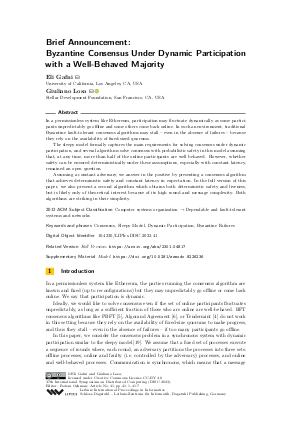Brief Announcement: Byzantine Consensus Under Dynamic Participation with a Well-Behaved Majority
Authors
Eli Gafni,
Giuliano Losa 
-
Part of:
Volume:
37th International Symposium on Distributed Computing (DISC 2023)
Part of: Series: Leibniz International Proceedings in Informatics (LIPIcs)
Part of: Conference: International Symposium on Distributed Computing (DISC) - License:
 Creative Commons Attribution 4.0 International license
Creative Commons Attribution 4.0 International license
- Publication Date: 2023-10-05
File

PDF
LIPIcs.DISC.2023.41.pdf
- Filesize: 0.53 MB
- 7 pages
Document Identifiers
Related Versions
- Full Version https://arxiv.org/abs/2301.04817
Subject Classification
ACM Subject Classification
- Computer systems organization → Dependable and fault-tolerant systems and networks
Keywords
- Consensus
- Sleepy Model
- Dynamic Participation
- Byzantine Failures
Metrics
- Access Statistics
-
Total Accesses (updated on a weekly basis)
0Document
0Metadata
Abstract
In a permissionless system like Ethereum, participation may fluctuate dynamically as some participants unpredictably go offline and some others come back online. In such an environment, traditional Byzantine fault-tolerant consensus algorithms may stall - even in the absence of failures - because they rely on the availability of fixed-sized quorums. The sleepy model formally captures the main requirements for solving consensus under dynamic participation, and several algorithms solve consensus with probabilistic safety in this model assuming that, at any time, more than half of the online participants are well behaved. However, whether safety can be ensured deterministically under these assumptions, especially with constant latency, remained an open question. Assuming a constant adversary, we answer in the positive by presenting a consensus algorithm that achieves deterministic safety and constant latency in expectation. In the full version of this paper, we also present a second algorithm which obtains both deterministic safety and liveness, but is likely only of theoretical interest because of its high round and message complexity. Both algorithms are striking in their simplicity.
Cite As Get BibTex
Eli Gafni and Giuliano Losa. Brief Announcement: Byzantine Consensus Under Dynamic Participation with a Well-Behaved Majority. In 37th International Symposium on Distributed Computing (DISC 2023). Leibniz International Proceedings in Informatics (LIPIcs), Volume 281, pp. 41:1-41:7, Schloss Dagstuhl – Leibniz-Zentrum für Informatik (2023)
https://doi.org/10.4230/LIPIcs.DISC.2023.41
BibTex
@InProceedings{gafni_et_al:LIPIcs.DISC.2023.41,
author = {Gafni, Eli and Losa, Giuliano},
title = {{Brief Announcement: Byzantine Consensus Under Dynamic Participation with a Well-Behaved Majority}},
booktitle = {37th International Symposium on Distributed Computing (DISC 2023)},
pages = {41:1--41:7},
series = {Leibniz International Proceedings in Informatics (LIPIcs)},
ISBN = {978-3-95977-301-0},
ISSN = {1868-8969},
year = {2023},
volume = {281},
editor = {Oshman, Rotem},
publisher = {Schloss Dagstuhl -- Leibniz-Zentrum f{\"u}r Informatik},
address = {Dagstuhl, Germany},
URL = {https://drops.dagstuhl.de/entities/document/10.4230/LIPIcs.DISC.2023.41},
URN = {urn:nbn:de:0030-drops-191675},
doi = {10.4230/LIPIcs.DISC.2023.41},
annote = {Keywords: Consensus, Sleepy Model, Dynamic Participation, Byzantine Failures}
}
Author Details
Supplementary Materials
References
- James Aspnes. A modular approach to shared-memory consensus, with applications to the probabilistic-write model. In Proceedings of the 29th ACM SIGACT-SIGOPS symposium on Principles of distributed computing, 2010. URL: https://doi.org/10.1145/1835698.1835802.
- Christian Badertscher, Peter Gaži, Aggelos Kiayias, Alexander Russell, and Vassilis Zikas. Ouroboros Genesis: Composable Proof-of-Stake Blockchains with Dynamic Availability. In Proceedings of the 2018 ACM SIGSAC Conference on Computer and Communications Security, 2018. URL: https://doi.org/10.1145/3243734.3243848.
- P. Berman, J. A. Garay, and K. J. Perry. Towards optimal distributed consensus. In Proceedings of the 30th Annual Symposium on Foundations of Computer Science, 1989. URL: https://doi.org/10.1109/SFCS.1989.63511.
- Ethan Buchman, Jae Kwon, and Zarko Milosevic. The latest gossip on BFT consensus, 2019. URL: https://doi.org/10.48550/arXiv.1807.04938.
- Miguel Castro and Barbara Liskov. Practical byzantine fault tolerance and proactive recovery. ACM Transactions on Computer Systems, 20, 2002. URL: https://doi.org/10.1145/571637.571640.
- Jing Chen, Sergey Gorbunov, Silvio Micali, and Georgios Vlachos. ALGORAND AGREEMENT: Super Fast and Partition Resilient Byzantine Agreement, 2018. URL: https://eprint.iacr.org/2018/377.
- Jing Chen and Silvio Micali. Algorand: A secure and efficient distributed ledger. Theoretical Computer Science, 777, 2019. URL: https://doi.org/10.1016/j.tcs.2019.02.001.
- Phil Daian, Rafael Pass, and Elaine Shi. Snow White: Robustly Reconfigurable Consensus and Applications to Provably Secure Proof of Stake. In Financial Cryptography and Data Security, 2019. URL: https://doi.org/10.1007/978-3-030-32101-7_2.
-
Francesco D'Amato, Joachim Neu, Ertem Nusret Tas, and David Tse. No More Attacks on Proof-of-Stake Ethereum? arXiv preprint arXiv:2209.03255, 2022.

- D. Dolev and H. R. Strong. Authenticated Algorithms for Byzantine Agreement. SIAM Journal on Computing, 12, 1983. URL: https://doi.org/10.1137/0212045.
- Eli Gafni. Round-by-round Fault Detectors (Extended Abstract): Unifying Synchrony and Asynchrony. In Proceedings of the Seventeenth Annual ACM Symposium on Principles of Distributed Computing, 1998. URL: https://doi.org/10.1145/277697.277724.
- Eli Gafni and Vasileios Zikas. Synchrony/Asynchrony vs. Stationary/Mobile? The Latter is Superior...in Theory, 2023. URL: https://doi.org/10.48550/arXiv.2302.05520.
- Vipul Goyal, Hanjun Li, and Justin Raizes. Instant Block Confirmation in the Sleepy Model. In Financial Cryptography and Data Security, 2021. URL: https://doi.org/10.1007/978-3-662-64331-0_4.
- Andrew Lewis-Pye and Tim Roughgarden. Permissionless Consensus, 2023. URL: https://doi.org/10.48550/arXiv.2304.14701.
- Giuliano Losa and Eli Gafni. Consensus in the Unknown-Participation Message-Adversary Model, January 2023. URL: https://doi.org/10.48550/arXiv.2301.04817.
- Dahlia Malkhi, Atsuki Momose, and Ling Ren. Byzantine Consensus under Fully Fluctuating Participation, 2022. URL: https://eprint.iacr.org/2022/1448.
- S. Micali, M. Rabin, and S. Vadhan. Verifiable random functions. In 40th Annual Symposium on Foundations of Computer Science, 1999. URL: https://doi.org/10.1109/SFFCS.1999.814584.
- Atsuki Momose and Ling Ren. Constant Latency in Sleepy Consensus. In Proceedings of the 2022 ACM SIGSAC Conference on Computer and Communications Security, 2022. URL: https://doi.org/10.1145/3548606.3559347.
- Rafael Pass and Elaine Shi. The Sleepy Model of Consensus. In Advances in Cryptology – ASIACRYPT 2017, 2017. URL: https://doi.org/10.1007/978-3-319-70697-9_14.
- Youer Pu, Lorenzo Alvisi, and Ittay Eyal. Safe Permissionless Consensus. In 36th International Symposium on Distributed Computing (DISC 2022), volume 246, 2022. URL: https://doi.org/10.4230/LIPIcs.DISC.2022.33.
